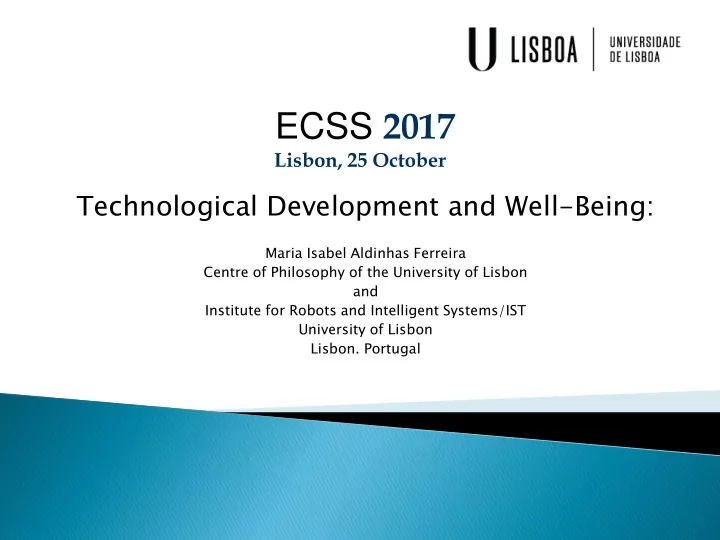

ECSS 2017 Lisbon, 25 October Technological Development and Well-Being: Maria Isabel Aldinhas Ferreira Centre of Philosophy of the University of Lisbon and Institute for Robots and Intelligent Systems/IST University of Lisbon Lisbon. Portugal
ECSS 2017 “ Artificial Intelligence has the potential to help address some of the biggest challenges that society faces. Smart vehicles may save hundreds of thousands of lives every year worldwide, and increase mobility for the elderly and those with disabilities. Smart buildings may save energy and reduce carbon emissions. Precision medicine may extend life and increase quality of life. Smarter government may serve citizens more quickly and precisely, better protect those at risk, and save money. AI-enhanced education may help teachers give every child an education that opens doors to a secure and fulfilling life. These are just a few of the potential benefits if the technology is developed with an eye to its benefits and with careful consideration of its risks and challenges” . In PREPARING FOR THE FUTURE OF ARTIFICIAL INTELLIGENCE – The Obama Report (Oct 2016)
ECSS 2017 January/February 2004 is a milestone in the pathway towards the definition of an ethical framework for robotics and AI in general. During the First International Symposium of Roboethics (Sanremo, Jan/Feb. 2004. philosophers, jurists, sociologists, anthropologists together with robotic scientists laid the foundations of the Ethics in the designing, developing and employing embodied artificial systems. A human centred applied ethics that should inspire the design and production of all artificial systems.
This Human Centred framework takes as grounding stones: The Universal Declaration of Human Rights. • The International Covenant on Civil and Political Rights, 1966. • The International Covenant on Economic, Social and Cultural Rights, 1966. • The International Convention on the Elimination of All Forms of Racial Discrimination, 1965. The Convention on the Rights of the Child. • The Convention on the Elimination of All Forms of Discrimination against Women, 1979. • The Convention on the Rights of Persons with Disabilities, 2006. • The Geneva Conventions and additional protocols, 1949. • IRTF’s Research into Human Rights Protocol Considerations. • The UN Guiding Principles on Business and Human Rights, 2011
Fundamental Concepts: Human Dignity Human Rights Well-Being
ECSS 2017 The present concerns with the individual’s well-being (as a consequence of the Beyond the GDP Conference) have recentered Aristotle’s concept of Eudaimonia- roughly translated as “satisfaction with life” - as the goal of human thought and action. But fundamentally they have recentred human dignity, human values and human rights.
In January 2017, the EU Legal Affairs Committee has issued a report wiith recommendations to the Commission on the civil-law and ethical aspects of robotics. In what concerns ethics the report proposes two draft codes of conduct: A Code of Ethical Conduct for Robotics Engineers A Code for Research Ethics Committees The Code of Ethical Conduct for Robotics Engineers defines 4 ethical principles: (1) beneficence (2) non-maleficence (3) autonomy (human interaction with robots should be voluntary) (4) justice (the benefits of robotics should be distributed fairly)
Ethically Aligned Design: A Vision for Prioritizing Human Well-Being with Artificial Intelligence and Autonomous Systems part of the IEEE Global Initiative for Ethical Considerations in Artificial Intelligence and Autonomous Systems,2016
This initiative aims at defining high-level ethical concerns applying to all types of AI/AS that: 1. Embody the highest ideals of human rights. 2. Prioritize the maximum benefit to humanity and the natural environment. 3. Mitigate risks and negative impacts as AI/AS evolve as socio-technical systems
General Principles: Principle 1 – Human Benefit Principle 2 – Responsibility Principle 3 – Transparency Principle 4 – Education and Awareness
ECSS 2017 Fei-Fei Li (director of Stanford’s AI Lab and chief scientist of Google Cloud points out (9 Oct 2017) “we have to put Humans at the Centre of AI” A human-centred approach/ A user-centred approach is fundamental in all domains, be these technological or not. It will allow: 1. to identify the user(s) of the technology 2. To define the user’s framework of reference 3. To identify and antecipate potential ethical issues involved in that particular framework
ECSS 2017 A human-centred approach will define education as its first priority: of the user and of the society as a whole. It involves researchers, industry and consumers, it involves us all
ECSS 2017 Thank you for your attention
Recommend
More recommend